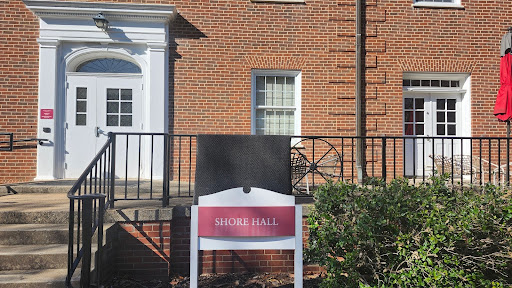On Oct. 11, during Guilford College President Jane Fernandes’ inaugural board of trustees meeting, the board took decisive steps to ensure that faculty compensation, student financial aid and college programs will not fall prey to budget cuts this year.
Every October, the board of trustees hosts an annual meeting to finalize the budget for the current academic year.
“The board of trustees meets at least three times a year to attend to the business of the college, which means we oversee operations like finance and budget and receive reports from the subcommittees,” said Edward Winslow III, new board chairman. “We also set policies and observe and assess the president’s performance.”
There are 11 standing committees that meet to discuss the issues facing the College and send representatives to address the full board with their concerns.
For instance, the Student Affairs Committee was concerned about funding for Serendipity and other student activities as well as continued financial aid in a difficult economy.
“Leading the college right now is a tough job when you’re not getting support from the government for private institutions,” said sophomore José Oliva, Community Senate president and Student Affairs Committee member. “We need to find new funding. Money is what runs a lot of the services and, because not everyone can pay $45,000 (in tuition), there need to be other means of bringing investment into the school.”
Considering that enrollment has been slipping since 2008, and tuition is the main source of revenue for the college, the picture for financial aid looks challenging.
“Tuition and fees are the lifeline for the operating expense of the college,” said Ty Buckner, associate vice president of marketing. “There is some fundraising, but most of the college’s operating revenue comes from tuition and fees. There is some draw on our endowment … about $2 or 3 million — against a $50 million budget. That’s not a lot.”
Another significant issue raised at the meeting was faculty compensation, which has been stagnant in the past few years.
“Clearly, the big issue right now is faculty salaries because we have not had raises for three of the last four years, and the board knows that,” said Elwood Parker, faculty representative on the board and professor of mathematics. “I think … we’ve lost some faculty because we haven’t paid them well.”
The board was worried that they would need to sacrifice either faculty compensation or financial aid. But Winslow, speaking for the board, assured that that would not be the case as the result of the decisions taken at the meeting. In fact, as part of the budget, the board has approved more expenditure going towards financial aid than anticipated and has ensured that the faculty compensation issue would be addressed.
“We’re granting much more financial aid than we had planned on, which is something Guilford has always been committed to as it enables us to have a diverse student body,” said Winslow. “You’re always striking a balance (between) your biggest expense — compensating the faculty and staff — and your biggest source of revenue — tuition. When you have reduced tuition, you’re going to have to make sacrifices somewhere or find money elsewhere.”
In fact, the board has voted against sacrificing programs, financial aid and faculty compensation. Instead, they have decided to borrow money and utilize money saved on faculty healthcare — thanks to a relatively healthy staff — to make up the shortfall from tuition and fees. Specifics about faculty raises or how much the school would be borrowing and from whom are not yet available, but a bold direction has been set.
Fernandes addressed the College’s financial situation in two sessions of an open budget forum on Oct. 22.











